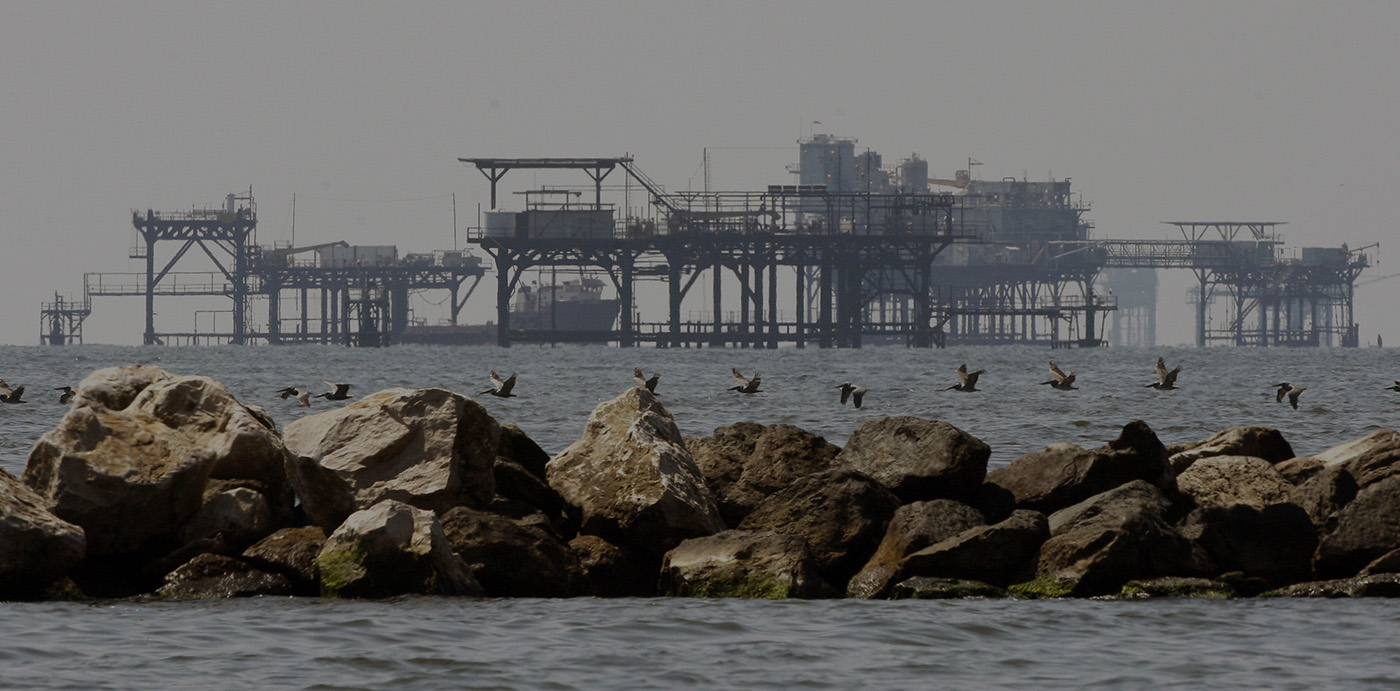Caught Between Erosion and an Oil Rig
Billions are being spent, but Louisiana is still washing into the sea
April 4, 2016

For nearly 30 years Ted Falgout ran Port Fourchon off the southernmost coast of Louisiana. It’s one of the most significant ports in the United States for oil transportation. Recently, the port and the highway that leads to it have been flooding because of rising sea levels. It’s one of the first places in the U.S. where you can really see the tangible, economic impacts of climate change.
Ted is advocating for coastal restoration and even started a nonprofit specifically to lobby the government to take action and protect the port and highway.
The irony of it all is not lost on him: Climate change is making it harder to transport oil from the port. And to build the infrastructure to combat rising sea levels, the port relies on revenue from offshore oil and gas drilling.
John Hockenberry of The Takeaway spoke with Ted about how he grapples with these competing interests. The transcript below of their conversation has been lightly edited for length and clarity.
John Hockenberry: Is it fair to say that carbon is your business?
Ted Falgout: Yes. I would be willing to accept that.
Would you say you're a climate change activist at this point?
Ted Falgout: I'm a climate change participant! I have to deal with it every day. And I think coastal Louisiana is gonna be the fishbowl that everybody gets to watch and learn from because it's gonna start impacting more and more coastal communities across the country and world.
How would you respond to people who want to maintain that there's no human cause to climate change, when you're seeing the tangible results of it?
Ted Falgout: Well we clearly understand sea level rise and have been experiencing it for quite some time. And we fully believe that its rate is increasing.
Tell me how you began to discover that water levels in the Gulf were enough of a phenomenon that it was gonna impede your ability to do your work?
Ted Falgout: We have elevated highways to beyond the elevation estimates of a 100-year storm, we have raised property within the port. Because this one little dot on the map is so significant to this country and it would be so expensive, so environmentally impacting to try to just say, “Well, let's go do this somewhere else.” Untypical perhaps of a port, we have been one of the leaders in coastal restoration and doing things around the port to sustain ourselves way before it ever became cool to do coastal restoration.
Where are you going to get the money to continue these efforts? As the sea level rises slowly, where will those resources come from?
Ted Falgout: That's a very good question. Louisiana has lost the size of Rhode Island in land over the last 30 years. So we've been dealing with this for quite some time--we have spent billions of dollars already in dealing with it, but as we get closer and closer to the water level, we have to get more and more aggressive. Where do we get the money, you ask? The federal government collects bills from offshore oil and gas lease revenues. The federal government has not shared anything with the state prior to just recently. Now we're going to start sharing in offshore revenues a bit, and we've dedicated it to coastal restoration.
But you're in quite a position there, to basically cover the costs of the kind of investments you have to make to deal with sea level rise--that becomes an argument for more drilling for oil to get that money to do what you need to do, which probably makes things worse over the long haul.
Ted Falgout: Let me make a prediction for you: If we didn't have oil and gas production and we weren't so significant to this nation's energy, we would not be getting revenue sharing. There would be environmental concerns about the catastrophic loss of coastal Louisiana, but there would be no one coming in with the big bucks to try to help save it.
Does it ever feel like Mother Nature is playing a joke on you or you're unsuccessfully playing a joke on her?
Ted Falgout: It depends how you define success. I'm a Cajun, which is the French that were run out of Nova Scotia and settled in south Louisiana and had nothing there. We took to challenges. We will continue to work and find ways to enjoy the estuaries and our way of life, and the production of energy allows us to do that.
And I know you can make the case that, ‘oh, you're just exacerbating the situation.’ But as I said, if we didn't produce 30 percent of the nation's energy supply, very few people would care about coastal Louisiana washing into the sea.
Well Ted, thank you so much.
Ted Falgout: My pleasure.
Heat of the Moment is a long-term project about climate change, led by WBEZ Chicago.






 to WBEZ
to WBEZ
